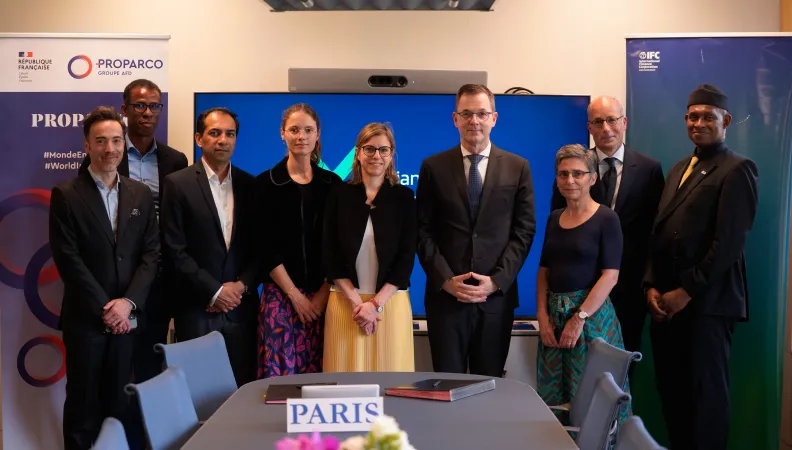Share the page
Proparco and IFC join forces to support Trade Finance and food security in Africa
Published on

To increase trade finance in Africa and strengthen the capacity of financial institutions and local importers and exporters, IFC and Proparco intend to implement several actions jointly to distribute risks and to strengthen both the demand and supply side of trade finance in Africa.
Trade supports economic growth and job creation, via both a direct source of income from exports and indirectly through imports. Exports provide a source of national income and liquidity, and imports provide crucial commodities and capital equipment that increase productivity. No country in the last 50 years has sustained high levels of growth and significantly increased per capita incomes without greatly expanding trade. Trade accounts for over one-half of the gross domestic product (“GDP”) of least developed countries, and financing trade has become increasingly important to a country’s development prospects.
Trade finance is a critical enabler of trade, underpinning 80 to 90 percent of trade globally and is thus critical to any economy, irrespective of country income group classification. Access to the full range of trade, supply chain, and working capital finance allows companies to scale their production by providing means to purchase inputs without having adequate cash at hand at the time of production, and sellers to stock more products than those being paid for at time of display, thus on aggregate propping up demand and smoothing trade transactions. In many developing countries, increased trade finance costs are adding to the already high cost of physically moving critical goods and commodities across borders.
In Africa, trade costs can be as high as 300 percent of the value of the merchandise being traded. The cost of trade finance (e.g., confirmed letters of credit) is six or seven times more expensive in Africa than in OECD countries. A recent study by IFC and the World Trade Organization (WTO) found that trade finance supports only 25 percent of goods traded in four countries in West Africa, well below the 60-80 percent global average. In Cote d’Ivoire, Ghana, Nigeria, and Senegal, the trade finance gap is US$14 billion annually. If the availability of trade finance in these countries increased to 40 percent, it could boost their merchandise exports and imports by around 8 percent, equivalent to nearly US$13 billion in annual trade.
Regional integration and trade are major opportunities for African countries to enhance long-term economic growth. Although growing every year, intra-African trade transactions are still very low, evidencing a clear need for further regional integration. Banks can play a critical role in facilitating trade in Africa by providing much-needed post-import and pre-export financing. To promote intra-Africa trade and expand their overall trade finance offerings, issuing banks need to expand their Correspondent Banking Relationships (“CBRs”) throughout the continent. IFC's Global Trade Finance Program (GTFP) facilitates issuing banks’ CBRs.
Announced in May 2021, the Alliance is a project-driven, private sector-focused, international cooperation platform whose main objective is to support sustainable and inclusive growth and execute ambitious plans for micro, small and medium-sized enterprises in Africa.
In this context, and as a reflection of their strong commitment to bolster Africa’s private sector, IFC and Proparco are Core Members of the Alliance for Entrepreneurship in Africa (“AforE” or the “Alliance”). IFC and Proparco intend to implement the following actions jointly to increase trade finance in Africa and strengthen the capacity of financial institutions and local importers and exporters. These were designed to distribute risks and to strengthen both the demand and supply side of trade finance in Africa.
Areas of Partnership
- Risk Distribution
IFC’s Global Trade Finance Program (GTFP) facilitates the trade finance transactions between confirming banks and issuing banks in emerging markets by offering confirming banks partial or full guarantees covering payment risk on issuing banks. Since 2005, GTFP has issued over 83,000 guarantees for more than US$88 billion in 100 emerging markets. The program has onboarded more than 450 issuing banks since inception. In Africa, IFC has onboarded over 120 banks in 37 countries historically and committed US$23 billion by issuing more than 15,000 guarantees.
IFC and Proparco are planning to establish a Risk Distribution Partnership under which Proparco would risk-participate in 50 percent of certain IFC’s GTFP exposures in selected Sub-Saharan African countries for up to US$500 million. The first tranche of US$200 million will be focused on food security. When possible, IFC will prioritize intra-Africa trade exposures under the Risk Distribution Partnership. The Partnership will allow IFC and Proparco to increase access to sustainable trade finance in the region by supporting trade transactions which will be aligned with Building Blocks 1 and 2 under IFC’s Paris Alignment Framework for financial intermediaries.
- Strengthening the local capacity of financial institutions in Africa
Trade finance training and technical assistance for local financial institutions are integral tools to help these institutions develop trade finance and other banking skills. In addition, meeting specific transparency standards, such as detecting trade-based Money Laundering (TBML), is vital to maintaining trade and financial relations with the global markets, notably through CBRs. IFC and Proparco intend to each secure funding to expand IFC’s current training and capacity-building programs of African financial institutions.
- Strengthening SME Exporters/Importers training programs on trade finance
Trade finance training programs for SMEs have seen considerable interest in low-income, fragile, and vulnerable economies, where companies are subject to the highest rejection rates when requesting trade finance. In this landscape, and to further support SME exporters and importers that are suffering from disrupted supply chains caused by the global context, IFC and Proparco intend to each secure funding to support trade finance training activities involving SME exporters and importers to facilitate access to trade finance in Africa and develop intra-Africa trade.
